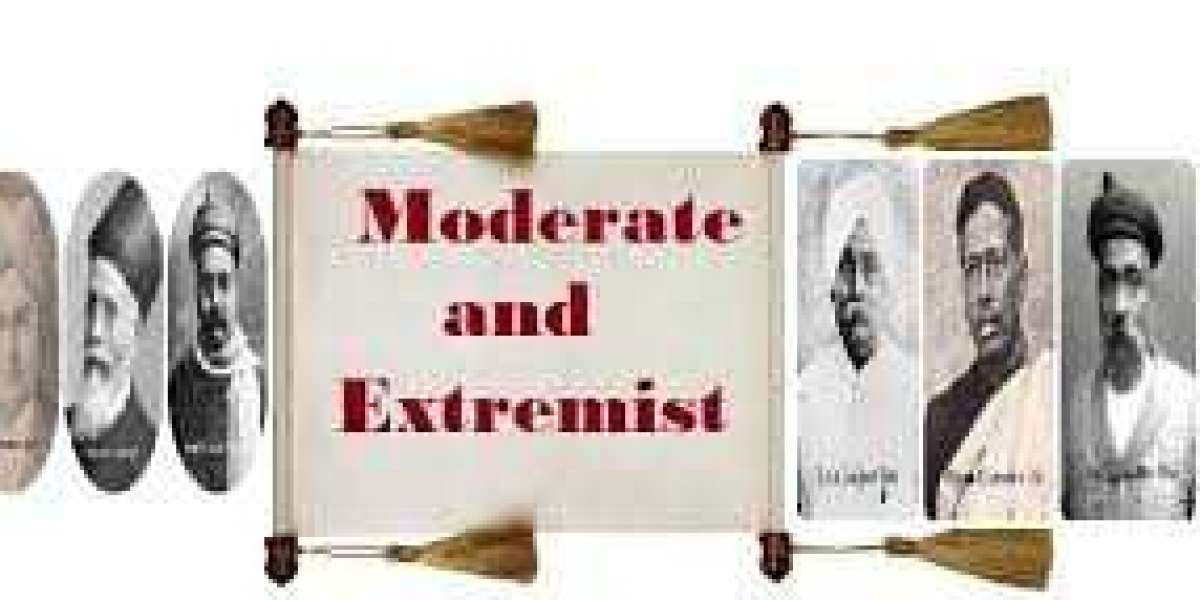Moderates were the early nationalists who used legal means for freedom struggle. They laid the initial building block of preparation and awakening of people for freedom struggle (during second half of 19th century). The extremists were leaders who did not believe in just prayer, petition and protest as a means of struggle. Leaders like Lala Lajpat Rai, Tilak and BC Pal were the early extremist leaders.
The difference between the moderates and the extremists:
View of the Britishers: The moderates believed in British political connection with India and expressed loyalty to the crown while the extremists considered them as exploiters and considered loyalty to crown as unworthy.
Methods: The moderates demanded constitutional reform whereas the extremists favoured extra-constitutional means like boycott and passive resistance with Swaraj as the primary objective.
Ideology: The moderates were mainly inspired by western liberal thought and European history while the extremists were inspired by Indian history, heritage and Hindu traditions.
Participation of the masses: Moderates believed that movement should be limited to middle class intelengesia and felt that masses were not ready for large scale movement. Extremists had huge faith in masses and called them to sacrifice for freedom struggle.
Support: The moderates had support from a smaller social base including the Zamindars and the upper middle class. On the other hand, the extremists had a wider social base from educated middle class and the lower middle class.
While they had differences between them, both groups played a key role in Indian national movement. The moderates laid the foundation for the freedom struggle beginning with their economic critique of British colonialism and awakened people. It was then taken forward by the extremists who took the movement to the masses. As succinctly noted by Tilak, the approach of both the groups was justified in their relative era because "extremists of today will be moderates of tomorrow".
Search
Popular Posts
-
 High-Performance Computing (HPC) Market is expected to grow to USD 54.9 billion by 2027
High-Performance Computing (HPC) Market is expected to grow to USD 54.9 billion by 2027
-
 Đối tượng được cấp thẻ tạm trú Việt nam
Đối tượng được cấp thẻ tạm trú Việt nam
-
 Things You Need to Consider While Investing in Go X Scooters to Earn Passive Income!
By Bopegic Bens
Things You Need to Consider While Investing in Go X Scooters to Earn Passive Income!
By Bopegic Bens -
 #Our leader: Biden will not sanction MBS over Khashoggi's killing despite US report implicating the Saudi leader
By Nic Roossy
#Our leader: Biden will not sanction MBS over Khashoggi's killing despite US report implicating the Saudi leader
By Nic Roossy -
 Causes of stress in the modern generation
By Shweta Saroj
Causes of stress in the modern generation
By Shweta Saroj
Categories
- Cars and Vehicles
- Comedy
- Economics and Trade
- Education
- Entertainment
- Movies & Animation
- Gaming
- History and Facts
- LiveStyle
- Natural
- News and Politics
- People and Nations
- Pets and Animals
- Places and Regions
- Science and Technology
- Sport
- Travel and Events
- Innovations & Strategies
- Employment
- Covid 19
- Controversial News
- Television
- LifeStyle
- Startup
- Technology
- Insurance
- Banking
- Economy
- Fitness
- Parenting
- Business
- Career
- Pet
- Nature
- Celebrity Gossip
- Money
- University
- Medical
- Social media
- Health
- Other


